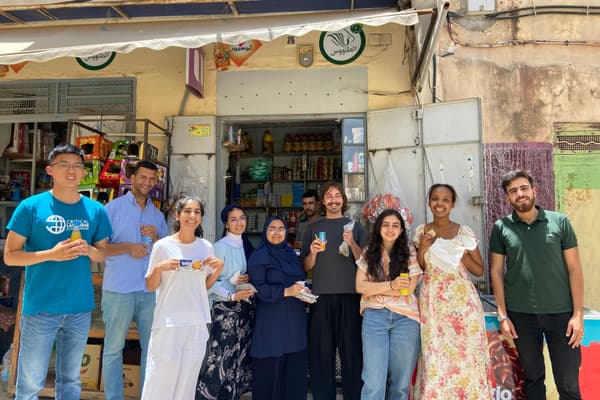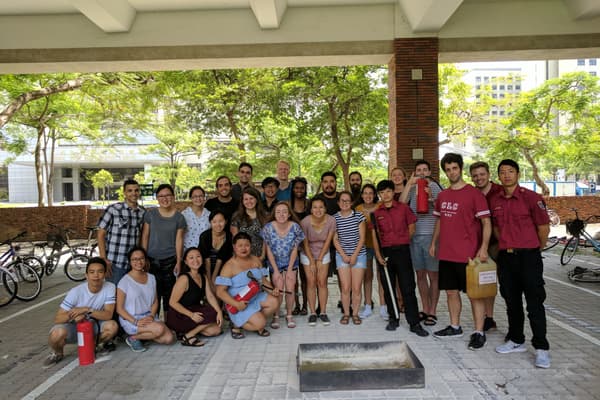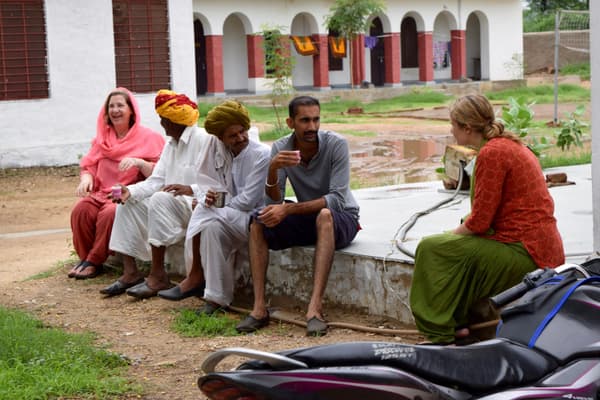Planning for Your Time Abroad
CLS Program sites are incredibly diverse. Some CLS participants live in major cities with millions of residents, while others are placed in smaller towns or more rural areas. The physical environment of a participant’s host city is likely different from what they are used to in the U.S. As a result, it is important for finalists to thoroughly research the climate, air and water quality, and infrastructure of their host city and to familiarize themselves with natural and man-made risks and challenges they may encounter during the program. Learning about the environment of the host city prior to departure can be extremely helpful for adjusting to the community upon arrival and staying safer while abroad.
Extreme Heat
Because the CLS Program takes place during the summer, and because many CLS host sites are located close to the equator, it is important for participants to prepare to experience prolonged periods of extreme heat and humidity while on program. Consistently hot temperatures can affect a person’s quality of sleep, hydration needs, and overall well-being. Participants should research strategies for coping with extreme heat prior to departure and should consider packing light-colored, loose-fitting clothing, rehydration salts, sunscreen, a sunhat, and other items that will help them function in hot weather. Finalists should also note that air conditioning may not be available in many buildings in the host community, including in host family homes.

Participants visit a local shop on a hot afternoon in Meknes, Morocco.
Natural Disasters
CLS host communities occasionally experience natural disasters and extreme weather events, including typhoons, earthquakes, wildfires, landslides, etc. While these events are rare, they can occur at any time and often with little warning. CLS finalists receive information about the natural disasters common to their host community in their CLS site-specific handbook and their pre-program orientation. Prior to departure, finalists should dedicate time to researching what to do if a disaster strikes and practicing techniques for surviving a natural disaster, such as dropping, covering, and holding on during an earthquake. The Centers for Disease Control and Prevention (CDC), Red Cross, and Ready.gov websites are useful resources for disaster preparedness advice. Upon arrival in the host city, participants undergo an on-site orientation in which institute staff share information about emergency contacts and procedures that participants should follow if a disaster occurs.

Students participate in a fire drill during on-site orientation in Tainan, Taiwan.
Environmental Hazards
Many CLS host communities experience environmental hazards. One of the most common is poor air quality, which is often exacerbated by hot weather during the summer. While high levels of air pollution can negatively affect anyone, the effects can be more serious for those with underlying health conditions. Finalists with respiratory conditions should consider bringing high-quality face masks with them from the U.S. and read about strategies for coping with air pollution. In addition to poor air quality, finalists should research other conditions they may encounter in the host community, such as the quality of tap water, which can transmit a variety of illnesses, and prevalence of car accidents and dangerous traffic conditions, which are a major cause of death and injury for U.S. citizens traveling abroad.
Crime and Personal Security
While anyone can become a victim of a crime, foreigners abroad can be particularly targeted. However, being informed and prepared can help international travelers reduce their chances of becoming a victim of a crime abroad. In order to understand the risks they might experience in their CLS host community, finalists should learn about the safety and security situation in their host city, including places that foreigners should avoid and common scams and tricks that thieves use when targeting foreigners. Finalists should thoroughly review the “Safety and Security” section of the U.S. Department of State’s destination page for their CLS host country or location, as well as the safety information provided in their CLS participant handbook and the pre-program and on-site orientations. It is also imperative that finalists learn about and practice basic safety skills, such as situational awareness and being discreet with money, and brush up on phrases in the target language such as “Stop!” and “Help!” Finalists should also consider what they can do to keep a lower profile while out and about in the host community.
All CLS finalists receive an emergency wallet card which lists important contact information, as well as the address of a hospital in the host community. Finalists should bring this card with them to their host community and keep it with them at all times while abroad. Prior to departure, finalists should also consider what resources in their home communities or on their home campuses, such as university health or wellness centers, they may be able to access while overseas to receive additional support if they experience crime while abroad.

CLS Hindi participants engage in conversation with a group of men at Barefoot College in Tiloniya, India during an excursion.
Accessibility
The physical infrastructure of CLS host communities often differs significantly from that of cities in the U.S. While it takes time for any participant to adjust to their host community, the differences in the physical environment can particularly affect participants who use a wheelchair or mobility aid, have limited mobility, are blind or have low vision, are deaf, deaf-blind, or hard of hearing, and/or have other disabilities.
Most CLS host countries and locations do not have laws requiring accessibility in public facilities as the Americans with Disabilities Act (ADA) does in the U.S. While abroad, participants may experience challenges navigating poorly lit, uneven, or pothole-covered streets and sidewalks and may find a lack of curb cuts, ramps, and functioning elevators in their host community. It is also likely that major infrastructure such as public transportation, hired rides and taxis, attractions, and residential buildings in the host community have limited or no wheelchair accessibility, accommodations for blind or deaf people, or emergency response plans that account for the needs of people with disabilities. Participants must also navigate complex attitudes and beliefs around disability in their host community, which can affect their interactions with others while abroad.
While these challenges may be significant, numerous students with disabilities have participated in the CLS Program. The CLS team is committed to supporting participants with both visible and invisible disabilities in preparing to go abroad and while in the host community. Finalists are encouraged to communicate their needs to CLS staff in detail using the Disability Accommodations Form in the spring. CLS Program staff then work with the finalist and the host institute to develop a plan for the participant’s accessibility throughout the program. A great resource to help participants prepare to go overseas is the Mobility International USA (MIUSA) website, which provides country-specific accessibility considerations, travel tips, and study abroad testimonials. Finalists with disabilities are also strongly encouraged to contact CLS alumni who have volunteered to speak about their experiences with accessibility and navigating cultural differences around disability abroad. Once on site, participants are urged to regularly update program staff about how planned accommodations are working out and whether any other needs have arisen.
Economic Disparity
CLS host communities differ greatly in their access to economic resources. A participant’s host community may be economically similar to their community in the U.S., wealthier, or less wealthy. Over time, participants gain insight into nuances of the economic systems of their host communities. Participants may encounter upsetting instances of social and economic disparity during the program. When this happens, CLS staff recommend taking time to reflect and discuss the situation with the Resident Director.
Solicitations for Money
While abroad, participants may sometimes be approached by people on the street, including small children, the elderly, or individuals with disabilities, asking for money. This may happen more often if a participant is identified as a foreigner. Solicitations for money are a common occurrence in more urban areas. It is up to participants whether to give money. Solicitations for money are usually not dangerous, but if a participant has safety concerns, CLS staff ask that participants prioritize their own immediate safety when deciding how to respond. If a participant encounters solicitations often or has safety concerns, they are encouraged to speak with their Resident Director or other program staff. Participants may also choose to speak with their Language Partner(s), host family, and/or roommate(s) to learn more about how local people view and approach these situations.


